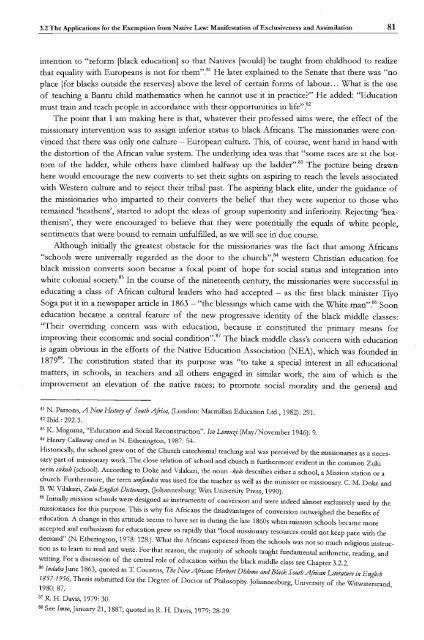South African Choral Music (Amakwaya): Song, Contest and the ...
South African Choral Music (Amakwaya): Song, Contest and the ...
South African Choral Music (Amakwaya): Song, Contest and the ...
Create successful ePaper yourself
Turn your PDF publications into a flip-book with our unique Google optimized e-Paper software.
3.2 The Applications for <strong>the</strong> Exemption from Native Law: Manifestation of Exclusiveness <strong>and</strong> Assimilation 81<br />
intention to "reform [black education] so that Natives [would] be taught from childhood to realize<br />
that equality with Europeans is not for <strong>the</strong>m".81 He later explained to <strong>the</strong> Senate that <strong>the</strong>re was "no<br />
place [for blacks outside <strong>the</strong> reserves] above <strong>the</strong> level of certain forms of labour... What is <strong>the</strong> use<br />
of teaching a Bantu child ma<strong>the</strong>matics when he cannot use it in practice?" He added: "Education<br />
must train <strong>and</strong> teach people in accordance with <strong>the</strong>ir opportunities in life".82<br />
The point that I am making here is that, whatever <strong>the</strong>ir professed aims were, <strong>the</strong> effect of <strong>the</strong><br />
missionary intervention was to assign inferior status to black <strong>African</strong>s. The missionaries were convinced<br />
that <strong>the</strong>re was only one culture - European culture. This, of course, went h<strong>and</strong> in h<strong>and</strong> with<br />
<strong>the</strong> distortion of <strong>the</strong> <strong>African</strong> value system. The underlying idea was that "some races are at <strong>the</strong> bottom<br />
of <strong>the</strong> ladder, while o<strong>the</strong>rs have climbed halfway up <strong>the</strong> ladder".83 The picture being drawn<br />
here would encourage <strong>the</strong> new converts to set <strong>the</strong>ir sights on aspiring to reach <strong>the</strong> levels associated<br />
with Western culture <strong>and</strong> to reject <strong>the</strong>ir tribal past. The aspiring black elite, under <strong>the</strong> guidance of<br />
<strong>the</strong> missionaries who imparted to <strong>the</strong>ir converts <strong>the</strong> belief that <strong>the</strong>y were superior to those who<br />
remained 'hea<strong>the</strong>ns', started to adopt <strong>the</strong> ideas of group superiority <strong>and</strong> inferiority. Rejecting 'hea<strong>the</strong>nism',<br />
<strong>the</strong>y were encouraged to believe that <strong>the</strong>y were potentially <strong>the</strong> equals of white people,<br />
sentiments that were bound to remain unfulfilled, as we will see in due course.<br />
Although initially <strong>the</strong> greatest obstacle for <strong>the</strong> missionaries was <strong>the</strong> fact that among <strong>African</strong>s<br />
"schools were universally regarded as <strong>the</strong> door to <strong>the</strong> church",84 western Christian education for<br />
black mission converts soon became a focal point of hope for social status <strong>and</strong> integration into<br />
white colonial society.85 In <strong>the</strong> course of <strong>the</strong> nineteenth century, <strong>the</strong> missionaries were successful in<br />
educating a class of <strong>African</strong> cultural leaders who had accepted - as <strong>the</strong> first black minister Tiyo<br />
Soga put it in a newspaper article in 1863 - "<strong>the</strong> blessings which came with <strong>the</strong> White man".86 Soon<br />
education became a central feature of <strong>the</strong> new progressive identity of <strong>the</strong> black middle classes:<br />
"Their overriding concern was with education, because it constituted <strong>the</strong> primary means for<br />
improving <strong>the</strong>ir economic <strong>and</strong> social condition".87 The black middle class's concern with education<br />
is again obvious in <strong>the</strong> efforts of <strong>the</strong> Native Education Association (NEA), which was founded in<br />
1879 88 . The constitution stated that its purpose was "to take a special interest in all educational<br />
matters, in schools, in teachers <strong>and</strong> all o<strong>the</strong>rs engaged in similar work, <strong>the</strong> aim of which is <strong>the</strong><br />
improvement an elevation of <strong>the</strong> native races; to promote social morality <strong>and</strong> <strong>the</strong> general <strong>and</strong><br />
81 N. Parsons, A New History of <strong>South</strong> Africa, (London: Macmillan Education Ltd., 1982): 291.<br />
82 Ibid.: 292-3.<br />
83 K. Mngoma, ''Education <strong>and</strong> Social Reconstruction". Iso Lomuzi (May/November 1946): 9.<br />
84 Henry Callaway cited in N. E<strong>the</strong>rington, 1987: 54.<br />
Historically, <strong>the</strong> school grew out of <strong>the</strong> Church catechismal teaching <strong>and</strong> was perceived by <strong>the</strong> missionaries as a necessary<br />
part of missionary work. The close relation of school <strong>and</strong> church is fur<strong>the</strong>rmore evident in <strong>the</strong> common Zulu<br />
term isikole (school). According to Doke <strong>and</strong> Vilakazi, <strong>the</strong> noun -kolo describes ei<strong>the</strong>r a school, a Mission station or a<br />
church. Fur<strong>the</strong>rmore, <strong>the</strong> term umfundisi was used for <strong>the</strong> teacher as well as <strong>the</strong> minister or missionary. C. M. Doke <strong>and</strong><br />
B. \Xl. Vilakazi, Zulu-English Dictionary, Gohannesburg: Wits University Press, 1990).<br />
85 Initially mission schools were designed as instruments of conversion <strong>and</strong> were indeed almost exclusively used by <strong>the</strong><br />
missionaries for this purpose. This is why for <strong>African</strong>s <strong>the</strong> disadvantages of conversion outweighed <strong>the</strong> benefits of<br />
education. A change in this attitude seems to have set in during <strong>the</strong> late 1860s when mission schools became more<br />
accepted <strong>and</strong> enthusiasm for education grew so rapidly that ''local missionary resources could not keep pace with <strong>the</strong><br />
dem<strong>and</strong>" (N. E<strong>the</strong>rington, 1978: 128.). What <strong>the</strong> <strong>African</strong>s expected from <strong>the</strong> schools was not so much religious instruction<br />
as to learn to read <strong>and</strong> write. For that reason, <strong>the</strong> majority of schools taught fundamental arithmetic, reading, <strong>and</strong><br />
writing. For a discussion of <strong>the</strong> central role of education within <strong>the</strong> black middle class see Chapter 3.2.2.<br />
86 Indaba June 1863, quoted in T. Couzens, The New <strong>African</strong>: Herbert Dhlomo <strong>and</strong> Black <strong>South</strong> Ajrican Literature in English<br />
1857-1956, Thesis submitted for <strong>the</strong> Degree of Doctor of Philosophy. Johannesburg, University of <strong>the</strong> Witwatersr<strong>and</strong>,<br />
1980: 87.<br />
87 R. H. Davis, 1979: 30.<br />
88 See Imvo,January 21,1887; quoted in R. H. Davis, 1979: 28-29.

















